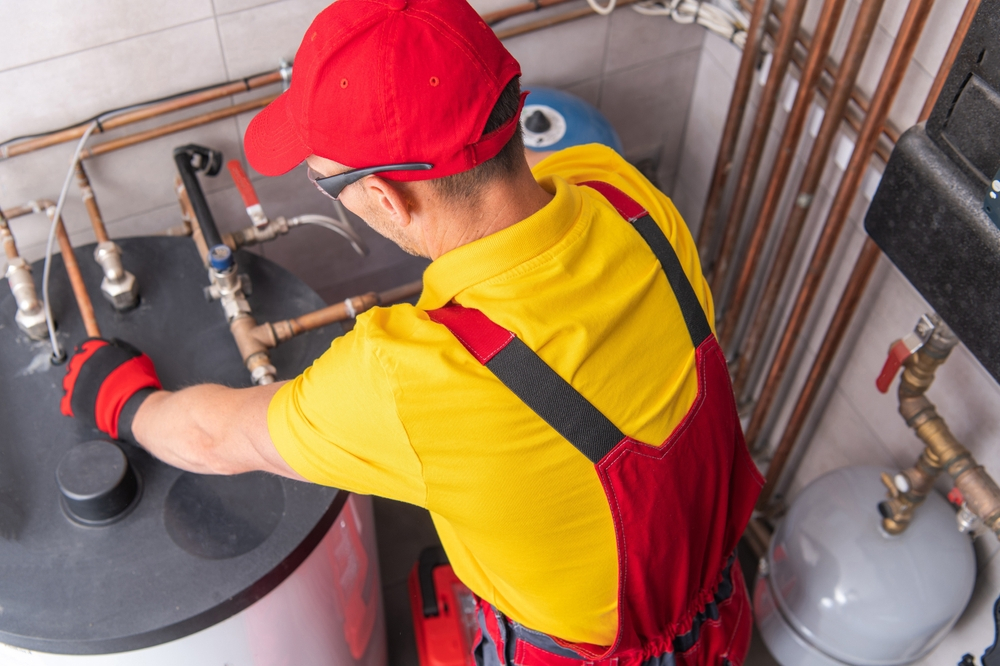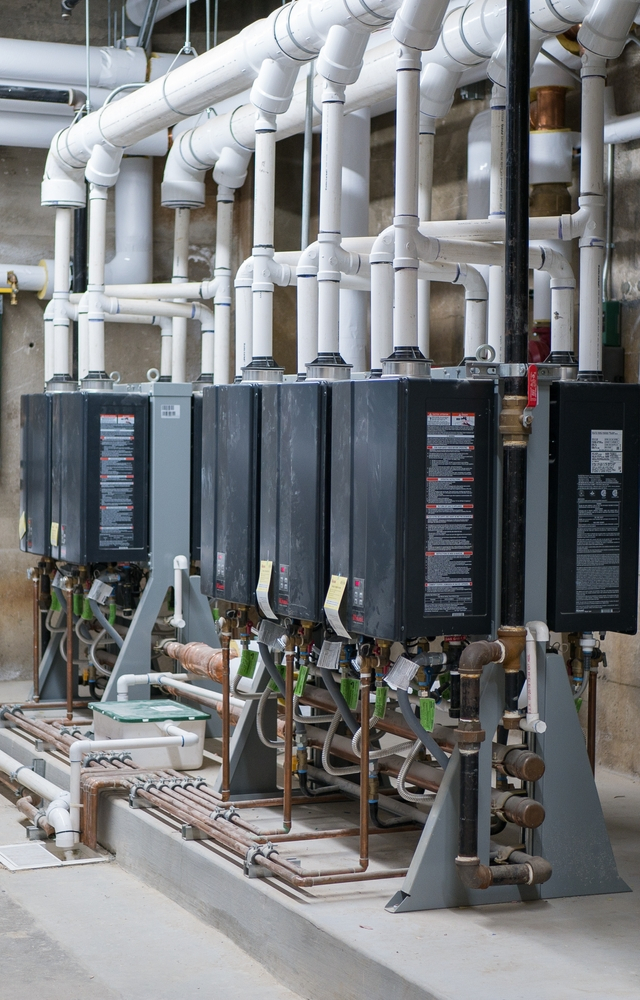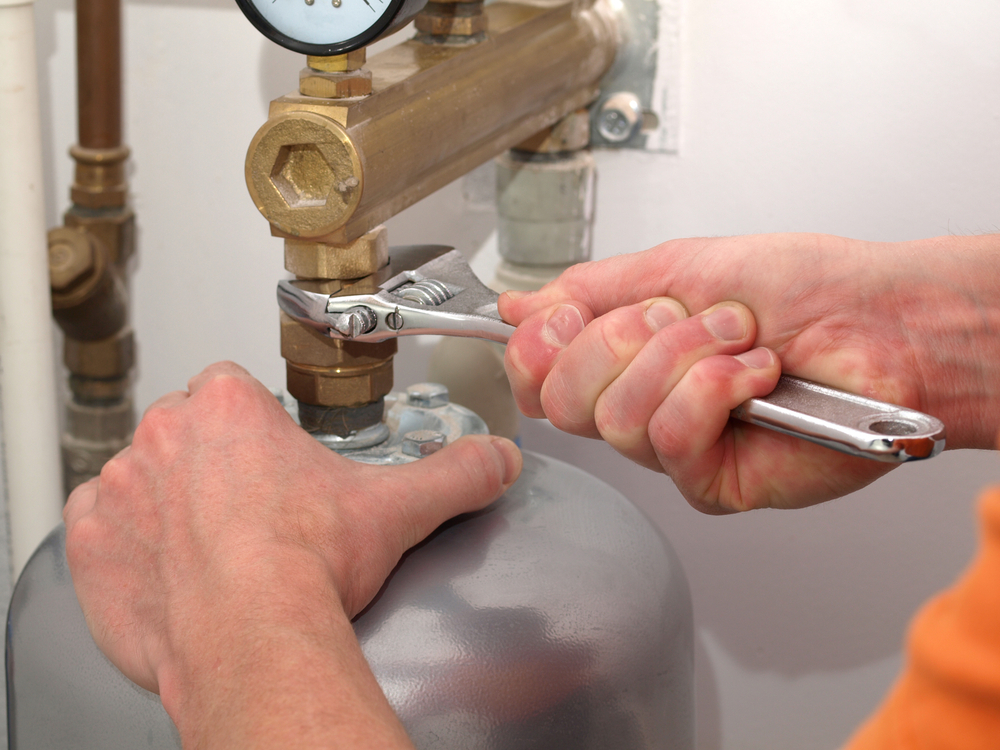Hot water is the backbone of our daily routines, whether it’s for a refreshing morning shower, a load of laundry, or a soothing cup of tea. Yet, in the hustle and bustle of daily life, we often take for granted the mechanisms behind this modern convenience. Water heaters play a crucial role in ensuring that we have a steady supply of hot water whenever we need it. In this article, we’ll delve into the world of water heaters, exploring the different types of water heater available and helping you determine which one best suits your needs.

Conventional Storage Tank Water Heaters
Imagine a large cylindrical tank quietly residing in your basement or utility closet, diligently keeping water heated and ready for use at any moment. This is the essence of a conventional storage tank water heater. These stalwart appliances have been a staple in households for decades, providing a reliable source of hot water for bathing, cleaning, and cooking.
Description and Working Mechanism:
Conventional storage tank water heaters consist of a large insulated tank that holds a reservoir of hot water. The tank is equipped with heating elements (typically electric) or a gas burner, which maintain the water temperature at a set level. When hot water is needed, it is drawn from the top of the tank and replenished with cold water, which is then heated to replace it.
Pros:
- Affordable Upfront Cost: One of the primary advantages of conventional storage tank water heaters is their relatively low initial cost compared to other types of water heaters. The straightforward design and widespread availability of these units contribute to their affordability.
- Easy Installation: Installation of a conventional storage tank water heater is typically straightforward, especially in homes that already have the necessary infrastructure in place. Professional plumbers of water heater can quickly set up these units with minimal hassle.
Cons
- Limited Hot Water Supply: Perhaps the most significant drawback of conventional storage tank water heaters is their finite hot water supply. Once the tank’s capacity is depleted, it takes time for the water to reheat, resulting in potential delays and discomfort during periods of high demand.
- Higher Energy Consumption: Another downside is the continuous energy consumption required to keep the water in the tank heated. Even when no hot water is being used, the heater must maintain the water temperature, leading to energy inefficiency and higher utility bills.
Energy Efficiency, Cost, and Maintenance:
Conventional storage tank water heaters are known for their relatively low energy efficiency compared to newer, more innovative models. The constant heating of water in the tank contributes to standby heat loss, where heat dissipates into the surrounding environment even when hot water isn’t being used. Additionally, the need to continually reheat water results in higher energy consumption over time.
In terms of cost, conventional storage tank water heaters are typically the most budget-friendly option upfront. However, it’s essential to consider the long-term operating costs, including energy consumption and potential maintenance expenses.
Maintenance for these units generally involves periodic flushing of the tank to remove sediment buildup, inspection of heating elements or burner components, and replacement of anode rods to prevent corrosion. Regular maintenance helps extend the lifespan of the water heater and ensures optimal performance.
Tankless Water Heaters
Say goodbye to bulky storage tanks and hello to sleek, space-saving units that provide hot water on demand. Tankless water heaters, also known as on-demand water heaters, are revolutionizing the way we think about heating water in our homes. These compact devices offer a continuous supply of hot water without the need for a storage tank, making them an attractive option for households of all sizes.
Description and Working Mechanism:
Tankless water heaters operate on a simple yet ingenious principle: heating water only when it’s needed. Rather than storing hot water in a tank, these units use high-powered burners or electric coils to heat water as it passes through the device. When a hot water tap is turned on, cold water flows into the unit, where it is rapidly heated to the desired temperature before being delivered to the faucet or appliance.
Pros:
- Unlimited Hot Water Supply: One of the most significant advantages of tankless water heaters is their ability to provide an endless supply of hot water. Since water is heated on demand, there’s no risk of running out during peak usage times.
- Energy-Efficient: Tankless water heaters are renowned for their energy efficiency, as they only consume energy when hot water is needed. By eliminating standby heat loss associated with storage tanks, these units can significantly reduce energy consumption and lower utility bills.
Cons:
- Higher Upfront Cost: While tankless water heaters offer long-term energy savings, they typically have a higher initial cost compared to conventional storage tank models. The price of installation, including any necessary modifications to accommodate the unit, can further add to the upfront expense.
- Additional Modifications May Be Required: Depending on the layout of your home and the existing plumbing infrastructure, installing a tankless water heater may necessitate modifications such as upgrading gas lines or electrical circuits. These additional expenses should be factored into the overall cost of the system.

Tankless Water Heaters
Energy Efficiency, Cost, and Maintenance:
Tankless water heaters are renowned for their energy efficiency, with some models boasting efficiency ratings of over 90%. By heating water only when needed, these units eliminate standby heat loss, resulting in significant energy savings over time. While the upfront cost of a tankless water heater may be higher than that of a conventional storage tank model, the potential for long-term energy savings can make them a cost-effective investment.
Maintenance requirements for tankless water heaters are generally minimal compared to conventional storage tank models. However, it’s essential to follow manufacturer recommendations for periodic maintenance, which may include flushing the unit to remove mineral deposits and inspecting components for signs of wear or damage.
Heat Pump Water Heaters:
Harnessing the ambient warmth of the surrounding air, heat pump water heaters offer a highly efficient and environmentally friendly solution for heating water in your home. These innovative appliances work on the same principle as air-source heat pumps, extracting heat from the air and transferring it to the water in the tank.
Description and Working Mechanism:
Heat pump water heaters operate by utilizing a heat pump mechanism to transfer heat from the surrounding air to the water in the tank. The unit contains a compressor, evaporator, condenser, and expansion valve, all of which work together to extract heat from the air and transfer it to the water. As the refrigerant within the system absorbs heat from the air, it is compressed and transferred to the water through a heat exchanger, raising its temperature.
Pros:
- Energy-Efficient: Heat pump water heaters are among the most energy-efficient options available, as they rely on ambient heat rather than directly generating heat. By transferring heat from the air to the water, these units can achieve high levels of efficiency and reduce energy consumption.
- Cost-Effective in the Long Run: While the upfront cost of a heat pump water heater may be higher than that of a conventional storage tank model, the potential for long-term energy savings can make them a cost-effective investment. With proper maintenance and operation, these units can significantly lower energy bills over time.
Cons:
- Higher Upfront Cost: One of the main drawbacks of heat pump water heaters is their higher initial cost compared to traditional storage tank models. The advanced technology and components used in these units contribute to their higher price tag.
- May Not Work Well in Colder Climates: Heat pump water heaters rely on the availability of ambient heat in the surrounding air to operate efficiently. In colder climates or during periods of extreme cold, the unit’s performance may be compromised, leading to decreased efficiency and potentially higher energy consumption.
Energy Efficiency, Cost, and Maintenance:
Heat pump water heaters are renowned for their exceptional energy efficiency, with some models boasting efficiency ratings of over 300%. By harnessing ambient heat from the air, these units can achieve high levels of efficiency and significantly reduce energy consumption compared to conventional storage tank models. While the initial cost of a heat pump water heater may be higher, the potential for long-term energy savings can make them a cost-effective investment.
Maintenance requirements for heat pump water heaters are generally minimal, consisting primarily of periodic inspections and cleaning to ensure optimal performance. It’s essential to follow manufacturer recommendations for maintenance and servicing to prolong the lifespan of the unit and maximize energy efficiency.
Solar Water Heaters
For those seeking a renewable and eco-friendly alternative to traditional water heating methods, solar water heaters offer a compelling solution. By harnessing the power of the sun’s rays, these systems provide a sustainable source of hot water while reducing reliance on fossil fuels and lowering carbon emissions.
Description and Working Mechanism:
Solar water heaters consist of solar collectors, storage tanks, and circulation systems that work together to harness solar energy and heat water. The solar collectors, typically mounted on the roof or in another sunny location, absorb sunlight and convert it into heat energy, which is transferred to a heat transfer fluid (such as antifreeze) circulating through the system. The heated fluid then flows to a heat exchanger in the storage tank, where it transfers its heat to the water, raising its temperature.
Pros:
- Environmentally Friendly: Solar water heaters are an environmentally friendly alternative to conventional water heating methods, as they rely on renewable solar energy rather than fossil fuels. By harnessing the power of the sun, these systems help reduce reliance on non-renewable resources and lower carbon emissions.
- Cost-Effective: While the upfront cost of installing a solar water heater may be higher than that of a conventional storage tank model, the long-term savings on energy bills can make them a cost-effective investment. With proper maintenance and operation, solar water heaters can significantly lower energy costs over their lifespan.
Cons:
- Dependent on Weather Conditions: One of the main drawbacks of solar water heaters is their reliance on sunlight to generate heat. Cloudy days, inclement weather, and nighttime conditions can all impact the system’s performance, potentially reducing hot water production and efficiency.
- Higher Upfront Cost: The initial cost of installing a solar water heater, including the purchase of solar collectors, storage tanks, and circulation systems, can be substantial. While incentives and rebates may help offset some of these costs, the upfront investment remains a significant consideration for homeowners.
Energy Efficiency, Cost, and Maintenance:
Solar water heaters are renowned for their exceptional energy efficiency, as they harness renewable solar energy to heat water. By utilizing sunlight as a free and abundant energy source, these systems can significantly reduce energy consumption and lower utility bills over time. While the upfront cost of installing a solar water heater may be higher than that of a conventional storage tank model, the potential for long-term energy savings can make them a cost-effective investment.
Maintenance requirements for solar water heaters are generally minimal, consisting primarily of periodic inspections and cleaning to ensure optimal performance. It’s essential to follow manufacturer recommendations for maintenance and servicing to maximize the lifespan of the system and ensure efficient operation.
Condensing Water Heaters:
Efficiency meets innovation with condensing water heaters, which extract heat from exhaust gases to maximize energy utilization. These advanced appliances represent the pinnacle of water heating technology, offering unparalleled efficiency and performance.
Description and Working Mechanism:
Condensing water heaters utilize a secondary heat exchanger to extract additional heat from the combustion gases produced during the heating process. Unlike conventional water heaters, which allow these gases to escape through the flue, condensing units capture the latent heat energy and transfer it to the water, increasing overall efficiency.
Pros:
- Highly Energy Efficient: Condensing water heaters are among the most energy-efficient options available, as they maximize heat transfer from combustion gases to the water. By capturing and utilizing latent heat energy that would otherwise be wasted, these units can achieve efficiency ratings of over 90%.
- Environmentally Friendly: By reducing energy consumption and minimizing greenhouse gas emissions, condensing water heaters help mitigate environmental impact and contribute to sustainability efforts.
Cons:
- Higher Upfront Cost: The advanced technology and components used in condensing water heaters contribute to their higher initial cost compared to conventional models. However, the potential for long-term energy savings can offset this upfront investment over time.
- Requires Proper Venting: Due to the nature of their operation, condensing water heaters require proper venting to safely expel combustion gases. This may involve additional installation costs and considerations to ensure compliance with building codes and regulations.

Condensing Water Heaters
Energy Efficiency, Cost, and Maintenance:
Condensing water heaters are renowned for their exceptional energy efficiency, as they maximize heat transfer from combustion gases to the water. By capturing and utilizing latent heat energy that would otherwise be wasted, these units can achieve efficiency ratings of over 90%, significantly reducing energy consumption and lowering utility bills.
While the upfront cost of a condensing water heater may be higher than that of a conventional model, the potential for long-term energy savings can make them a cost-effective investment. With proper maintenance and operation, condensing water heaters can deliver reliable performance and lower operating costs over their lifespan.
Maintenance requirements for condensing water heaters are generally minimal, consisting primarily of periodic inspections and cleaning to ensure optimal performance. It’s essential to follow manufacturer recommendations for maintenance and servicing to prolong the lifespan of the unit and maximize energy efficiency.
Conclusion:
In conclusion, the world of water heaters offers a diverse array of options, each with its own set of advantages and considerations. From conventional storage tank models to cutting-edge condensing units, there’s a water heater to suit every household’s needs and preferences.
When choosing the right water heater for your home, it’s essential to consider factors such as energy efficiency, cost, maintenance requirements, and environmental impact. By weighing these factors and consulting with professionals as needed, you can make an informed decision that will provide reliable hot water for years to come.
Whether you opt for the affordability of a conventional storage tank water heater, the efficiency of a tankless or heat pump model, the sustainability of a solar system, or the innovation of a condensing unit, there’s no shortage of options to explore. Ultimately, the best water heater for you is the one that meets your individual needs, budget, and priorities.
Plumbing Services CA
https://maps.app.goo.gl/31Yt4rhDrainzNJ4A
(279) 203-0765
https://plumbingservicesca.com/
